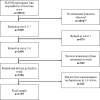Psychosocial working characteristics before retirement and depressive symptoms across the retirement transition: a longitudinal latent class analysis
- PMID: 32091111
- PMCID: PMC7737805
- DOI: 10.5271/sjweh.3889
Psychosocial working characteristics before retirement and depressive symptoms across the retirement transition: a longitudinal latent class analysis
Abstract
Objectives Retirement is a major life transition. However, previous evidence on its mental health effects has been inconclusive. Whether retirement is desirable or not may depend on pre-retirement work characteristics. We investigated trajectories of depressive symptoms across retirement and how a number of psychosocial working characteristics influenced these trajectories. Methods We included 1735 respondents from the Swedish Longitudinal Occupational Survey of Health (SLOSH), retiring during 2008-2016 (mean retirement age 66 years). They had completed biennial questionnaires reporting job demands, decision authority, workplace social support, efforts, rewards, procedural justice and depressive symptoms. We applied group-based trajectory modelling to model trajectories of depressive symptoms across retirement. Multinomial logistic regression analyses estimated the associations between -psychosocial working characteristics and depressive symptom trajectories. Results We identified five depression trajectories. In four of them, depressive symptoms decreased slightly around retirement. In one, the symptom level was initially high, then decreased markedly across retirement. Perceptions of job demands, job strain, workplace social support, rewards, effort-reward imbalance and procedural justice were associated with the trajectories, while perceptions of decision authority and work efforts were only partly related to the trajectories. Conclusions We observed a rather positive development of depressive symptoms across retirement in a sample of Swedish retirees. For a small group with poor psychosocial working characteristics, symptoms clearly decreased, which may indicate that a relief from poor working characteristics is associated with an improvement for some retirees. However, for other retirees poor working characteristics were associated with persistent symptoms, suggesting a long-term effect of these work stressors.
Conflict of interest statement
None declared.
Figures



Similar articles
-
Are there bidirectional relationships between psychosocial work characteristics and depressive symptoms? A fixed effects analysis of Swedish national panel survey data.Occup Environ Med. 2019 Jul;76(7):455-461. doi: 10.1136/oemed-2018-105450. Epub 2019 May 4. Occup Environ Med. 2019. PMID: 31055470 Free PMC article.
-
Psychosocial work characteristics, sleep disturbances and risk of subsequent depressive symptoms: a study of time-varying effect modification.J Sleep Res. 2017 Jun;26(3):266-276. doi: 10.1111/jsr.12494. Epub 2017 Jan 24. J Sleep Res. 2017. PMID: 28116758
-
Job demands, control and social support as predictors of trajectories of depressive symptoms.J Affect Disord. 2018 Aug 1;235:535-543. doi: 10.1016/j.jad.2018.04.067. Epub 2018 Apr 16. J Affect Disord. 2018. PMID: 29689506
-
A systematic review including meta-analysis of work environment and depressive symptoms.BMC Public Health. 2015 Aug 1;15:738. doi: 10.1186/s12889-015-1954-4. BMC Public Health. 2015. PMID: 26232123 Free PMC article. Review.
-
Heterogeneity in long-term trajectories of depressive symptoms: Patterns, predictors and outcomes.J Affect Disord. 2016 Mar 1;192:199-211. doi: 10.1016/j.jad.2015.12.030. Epub 2015 Dec 22. J Affect Disord. 2016. PMID: 26745437 Free PMC article. Review.
Cited by
-
Psychological Distress During the Retirement Transition and the Role of Psychosocial Working Conditions and Social Living Environment.J Gerontol B Psychol Sci Soc Sci. 2022 Jan 12;77(1):135-148. doi: 10.1093/geronb/gbab054. J Gerontol B Psychol Sci Soc Sci. 2022. PMID: 34396418 Free PMC article.
-
Depressive symptoms across the retirement transition in men and women: associations with emotion regulation, adjustment difficulties and work centrality.BMC Geriatr. 2024 Jul 31;24(1):643. doi: 10.1186/s12877-024-05228-2. BMC Geriatr. 2024. PMID: 39085792 Free PMC article.
-
Health and Care Dependency of Older Adults in Dresden, Germany: Results from the LAB60+ Study.Int J Environ Res Public Health. 2022 Sep 18;19(18):11777. doi: 10.3390/ijerph191811777. Int J Environ Res Public Health. 2022. PMID: 36142050 Free PMC article.
-
Air pollution associated with hospital visits for mental and behavioral disorders in Northeast China.Front Epidemiol. 2023 Mar 30;3:1090313. doi: 10.3389/fepid.2023.1090313. eCollection 2023. Front Epidemiol. 2023. PMID: 38455902 Free PMC article.
-
Historical and Cross-Country Differences in Life Satisfaction Across Retirement in Germany and Switzerland From 2000 to 2019.J Gerontol B Psychol Sci Soc Sci. 2023 Aug 2;78(8):1365-1374. doi: 10.1093/geronb/gbad066. J Gerontol B Psychol Sci Soc Sci. 2023. PMID: 37293925 Free PMC article.
References
-
- Christensen K, Doblhammer G, Rau R, Vaupel JW. Ageing populations:the challenges ahead. The Lancet. 2009;374(9696):1196–208. https://doi.org/10.1016/S0140-6736(09)61460-4. - PMC - PubMed
-
- Burdorf A. Is early retirement good for your health? BMJ. 2010;341 https://doi.org/10.1136/bmj.c6089. - PubMed
-
- van der Heide I, van Rijn RM, Robroek SJW, Burdorf A, Proper KI. Is retirement good for your health?A systematic review of longitudinal studies. BMC public health. 2013:13. https://doi.org/10.1186/1471-2458-13-1180. - PMC - PubMed
-
- Jokela M, Ferrie JE, Gimeno D, Chandola T, Shipley MJ, Head J, et al. From Midlife to Early Old Age Health Trajectories Associated With Retirement. Epidemiology. 2010;21(3):284–90. https://doi.org/10.1097/EDE.0b013e3181d61f53. - PMC - PubMed
-
- Oksanen T, Vahtera J, Westerlund H, Pentti J, Sjosten N, Virtanen M, et al. Is Retirement Beneficial for Mental Health?Antidepressant Use Before and After Retirement. Epidemiology. 2011;22(4):553–9. https://doi.org/10.1097/EDE.0b013e31821c41bd. - PMC - PubMed
Publication types
MeSH terms
LinkOut - more resources
Full Text Sources
Medical

